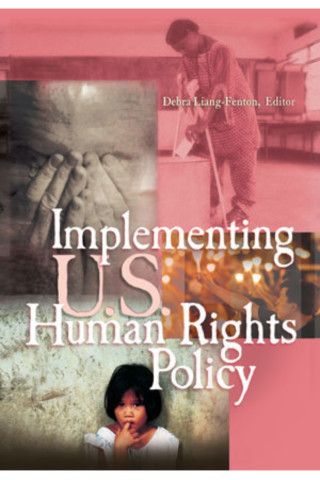Debra Liang-Fenton
Debra Liang-Fenton is senior program officer with USIP’s Academy. Her focus is on exploring strategies for establishing good governance in post-conflict environments, and creating institutional networks for successful transitions. Liang-Fenton is a specialist on issues of human rights, preventing electoral violence, and building foundations for sustainable peace.
From 2000 to 2007, Liang-Fenton served as the founding executive director of the U.S. Committee for Human Rights in North Korea, a nongovernmental organization dedicated to promoting human rights in North Korea. Under her leadership, the organization launched (with partner organization DLA Piper) a major campaign invoking the Responsibility to Protect doctrine with Nobel Laureate Elie Wiesel, former Czech President Vaclav Havel, and former Norwegian Prime Minister and founder of the Oslo Center for Peace and Human Rights Kjell Magne Bondevik. She is also responsible for exposing North Korea’s political prison camp system, publishing for the first time prisoner testimonies and satellite images of North Korea’s gulag.
Prior to the her work for the committee, Liang-Fenton directed USIP’s Human Rights Implementation Project, where she led a working group over a three-year period, distilling best practices for U.S. human rights policy based on lessons learned from 14 countries. Liang-Fenton also served as a founding editor of the Journal of Democracy, and was a program officer with the National Endowment for Democracy, exploring issues of accountability, political party development, and transitions.
Liang-Fenton serves on the Board of Directors of the Committee for Human Rights in North Korea (2007-present). She was awarded a Reagan-Fascell Fellowship at the National Endowment for Democracy (2004), and delivered the keynote address at Amnesty International’s Annual General Meeting in 2003.
Author's Books
Since the 1970s, the promotion of human rights has been an explicit goal of U.S. foreign policy. Successive presidents have joined with senators and representatives, hundreds of NGOs, and millions of ordinary citizens in deploring human rights abuses and urging that American power and influence be used to right such wrongs. Vigorous debates, bold declarations, and well-crafted legislation have shaped numerous policies designed to counter abuses and promote U.S. values across the globe.
But have such policies actually worked?
This incomparable volume answers that question by spotlighting no fewer than 14 cases spanning four continents and 25 years. In each case, a distinguished author charts efforts to implement U.S. policy and highlights the problems encountered. The chapters explore the interaction between competing moral, economic, and security considerations; examine the different challenges facing policymakers in Washington and practitioners in-country; and assess what worked, what did not work, and why. Throughout, the emphasis is on discovering useful lessons and offering practical advice to those considering new initiatives or trying to improve existing efforts.
Packed with insights, Implementing U.S. Human Rights Policy offers an even-handed and highly readable synopsis of the major human rights challenges of our times.

